
 James M. Cain however, was not happy with the changes made though he was impressed with Lana Turner’s performance, so impressed that he gave her a signed leather bound copy of the book. Off screen, Garfield was also “impressed” with Turner, and they had a short lived romantic liaison. Apparently, the sparks that flew on screen did not translate off-screen and the affair was over quickly though they remained friends long after the filming ended.
James M. Cain however, was not happy with the changes made though he was impressed with Lana Turner’s performance, so impressed that he gave her a signed leather bound copy of the book. Off screen, Garfield was also “impressed” with Turner, and they had a short lived romantic liaison. Apparently, the sparks that flew on screen did not translate off-screen and the affair was over quickly though they remained friends long after the filming ended. Frank convinces Cora to run away with him and abandon her roadside sandwich joint. The difference is the characters' reactions in the film, different from the poignant passage from the novel, when they find impossible their getaway since they don't have a home to go.
Frank convinces Cora to run away with him and abandon her roadside sandwich joint. The difference is the characters' reactions in the film, different from the poignant passage from the novel, when they find impossible their getaway since they don't have a home to go.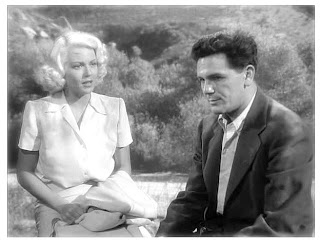 "She kept tugging at the hatbox. I tried to hold on to it, anyway to carry it back for her, but she got it. She started back with it. She had looked nice when she started out, with a little blue suit and blue hat, but now she looked all battered, and her shoes were dusty, and she couldn't even walk right, from crying. All of a sudden, I found out I was crying too". -Frank Chambers narrates his heartbreak when Cora decides to come back home with her husband.
"She kept tugging at the hatbox. I tried to hold on to it, anyway to carry it back for her, but she got it. She started back with it. She had looked nice when she started out, with a little blue suit and blue hat, but now she looked all battered, and her shoes were dusty, and she couldn't even walk right, from crying. All of a sudden, I found out I was crying too". -Frank Chambers narrates his heartbreak when Cora decides to come back home with her husband.
 In the film, however, Lana Turner's character even appears smiling on the road while they return walking and the scene is portrayed more as a reflective mood than disturbingly sad through a pronounced Weltschmerz impression as it's originally in the book.
In the film, however, Lana Turner's character even appears smiling on the road while they return walking and the scene is portrayed more as a reflective mood than disturbingly sad through a pronounced Weltschmerz impression as it's originally in the book. Some of these differences accentuate Cora Smith's unsentimentality and cold blood, an icy femme-fatale framed in platinum hair and turbans, who differs from the feisty Cora Papadakis, who comes off as more like a childish and doomed creature.
Some of these differences accentuate Cora Smith's unsentimentality and cold blood, an icy femme-fatale framed in platinum hair and turbans, who differs from the feisty Cora Papadakis, who comes off as more like a childish and doomed creature. John Garfield's character looks maybe more romantic in the film with some masculine naïvete, due to the contrasting to his femme fatale whom he falls in love in the story, whereas in the novel Frank Chambers is a no good tramp, a low-life seductor whose charms, which many women had vied for, will be only matched by Cora's.
John Garfield's character looks maybe more romantic in the film with some masculine naïvete, due to the contrasting to his femme fatale whom he falls in love in the story, whereas in the novel Frank Chambers is a no good tramp, a low-life seductor whose charms, which many women had vied for, will be only matched by Cora's. "Her arms were around me before I even cut the lights.
"Her arms were around me before I even cut the lights.We did plenty".
"We haven't wasted any time on talk."
"I was working in a hash house".
"When did you leave Iowa?"
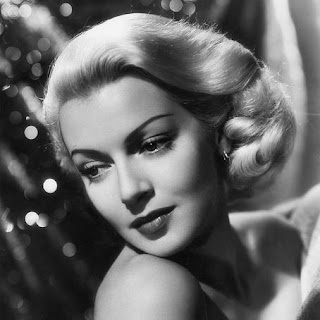 "Three years ago. I won a beauty contest. I won a high school beauty contest, in Des Moines. That's where I lived. The prize was a trip to Hollywood. I got off the Chief with fifteen guys taking my picture, and two weeks later I was in the hash house."
"Three years ago. I won a beauty contest. I won a high school beauty contest, in Des Moines. That's where I lived. The prize was a trip to Hollywood. I got off the Chief with fifteen guys taking my picture, and two weeks later I was in the hash house.""They gave me a test. It was all right in the face. But they talk, now. The pictures, I mean. And when I began to talk, up there on the screen, they knew me for what I was, and so did I. A cheap Des Moines trollop, that had as much chance in pictures as a monkey has. Not as much."
"And then?"
 "Then two years of guys pinching your leg and leaving nickel tips and asking how about a little party tonight. I went on some of them parties, Frank. You know what I mean about them parties?"
"Then two years of guys pinching your leg and leaving nickel tips and asking how about a little party tonight. I went on some of them parties, Frank. You know what I mean about them parties?""I know."
"Then he came along. I took him, and so help me, I meant to stick by him. But I can't stand it any more. God, do I look like a little white bird?"
"To me, you look more like a hell cat."
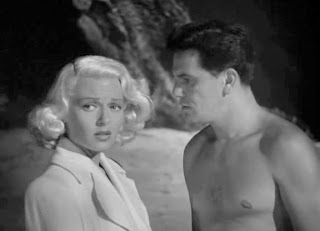 "You're not greasy. Frank, do you have any idea what that means?"
"You're not greasy. Frank, do you have any idea what that means?""I can kind of imagine."
"I don't think so. No man can know what that means to a woman. To have to be around somebody that's greasy and makes you sick at the stomach when he touches you. I'm not really such a hell cat, Frank."
"What are you trying to do? Kid me?"
 "Oh, all right. I'm a hell cat, then. But I don't think I would be so bad. With somebody that wasn't greasy."
"Oh, all right. I'm a hell cat, then. But I don't think I would be so bad. With somebody that wasn't greasy.""Cora, how about you and me going away?"
"Where to?"
"Anywhere. What do we care?"
"Anywhere. Anywhere. You know where that is?"
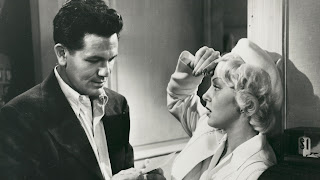 "All over. Anywhere we choose."
"All over. Anywhere we choose.""No it's not. It's the hash house."
"I'm not talking about the hash house. I'm talking about the road. It's fun, Cora. And nobody knows it better than I do. I know every twist and turn it's got. And I know how to work it, too. Isn't that what we want? Just to be a pair of tramps, like we really are?"
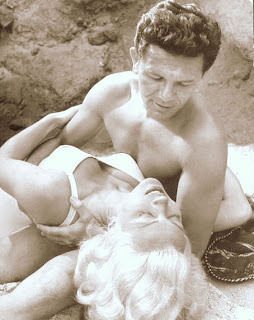 "I loved you. I would love you without even a shirt. I would love you specially without a shirt, so I could feel how nice and hard your shoulders are."
"I loved you. I would love you without even a shirt. I would love you specially without a shirt, so I could feel how nice and hard your shoulders are.""Socking railroad detectives developed the muscles".
"And you're hard all over. Big and tall and hard. You're not a little soft greasy guy with black kinky hair that he puts bay rum on every night."
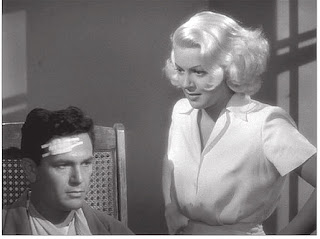 "We can kid ourself all we want to, and laugh about the money, and whoop about what a swell guy the devil is to be in bed with, but that's just where we are. I was going off with that woman, Cora".
"We can kid ourself all we want to, and laugh about the money, and whoop about what a swell guy the devil is to be in bed with, but that's just where we are. I was going off with that woman, Cora"."We were going to Nicaragua to catch cats. And why I didn't go away, I knew I had to come back. We're chained to each other, Cora. We thought we were on top of a mountain. That wasn't it. It's on top of us, and that's where it's been ever since that night."
"Is that the only reason you came back?"
"No. It's you and me. There's nobody else. I love you, Cora".
 "You must be a hell cat, though. You couldn't make me feel like this if you weren't."
"You must be a hell cat, though. You couldn't make me feel like this if you weren't.""That's what we're going to do. Kiss me, Frank. On the mouth."
"I kissed her. Her eyes were shining up at me like two blue stars. It was like being in church".
Frank Chambers: "With my brains and your looks, we could go places".
 "We got married at the City Hall, and then we went to the beach. She looked so pretty I just wanted to play in the sand with her, but she had this little smile on her face, and after a while she got up and went down to the surf. She went ahead, and I swam after her. She kept on going, and went a lot further out than she had before. Then she stopped, and I caught up with her. She swung up beside me, and took hold of my hand, and we looked at each other. She knew, then, that the devil was gone, that I loved her". -"The Postman Always Rings Twice" (1934) novel by James M. Cain.
"We got married at the City Hall, and then we went to the beach. She looked so pretty I just wanted to play in the sand with her, but she had this little smile on her face, and after a while she got up and went down to the surf. She went ahead, and I swam after her. She kept on going, and went a lot further out than she had before. Then she stopped, and I caught up with her. She swung up beside me, and took hold of my hand, and we looked at each other. She knew, then, that the devil was gone, that I loved her". -"The Postman Always Rings Twice" (1934) novel by James M. Cain.












2 comments :
this is one of the best noirs, Lana Turner was stunning in The Postman, and wild chemistry with John Garfield, good post!
absolutely, countsheep! The Postman Always Rings Twice is thematically similar to Double Indemnity which was based on another novel by Cain, although I also see important differences in the romantic angles and different narrative proposes, I for one prefer "The Postman Always Rings Twice", in "Double Indemnity" the relationships are much colder, so I favor the fatal romance angle here with the magnetic Turner & Garfield.
have a great weekend!
Post a Comment